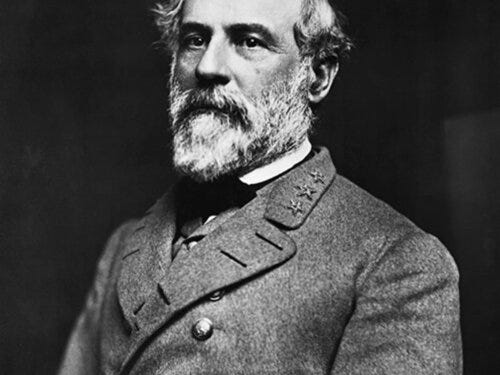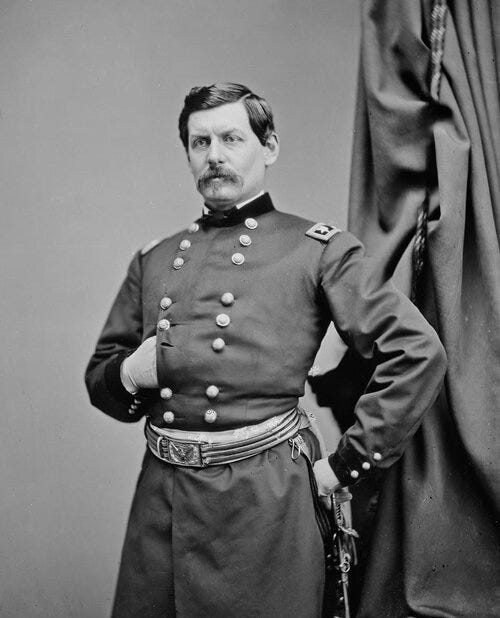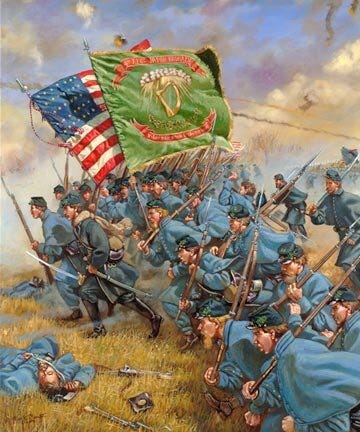Antietam - The Bloody Battle Over a Bridge
Lincoln wanted to play Risk. McClellan stood pat. Read how the bloodiest battle in the Civil War featured the Emancipation Proclamation and Robert E. Lee's favorite pastime.
When you think about the Civil War, you think of two clear objectives.
1. Eleven states in the South wanted to gain their independence and continue their way of life – specifically the right to own slaves.
2. While the twenty states to the North and West wanted to preserve the Union and not create another hostile government on its borders.
By no means am I a military war expert, but usually, when trying to win a war, it's about gaining territory from your enemies. Much like any board game, Risk, Stratego, or Axis & Allies, you try and defeat your younger siblings by taking their territories. The game usually concludes with you acquiring enough lands to be declared the winner or the youngest runs off crying.
Real war is basically the same thing.
However, the American Civil War was about the North crushing Southern rebels, not seizing their territories, and renaming North Carolina - New South Rhode Island, or something. The South had sympathizers in the North; it wanted to drag out the war, with the hopes that the North would simply cave, that a deadly and costly war wasn't worth it. It wasn't interested in bringing East Carolina BBQ to newly conquered Southern New South Jersey of the South.
So while, on this day, September 17, 1862, the two sides clashed in a sleepy town tucked between the western outposts of Maryland and, at the time, Virginia, no territories would be lost nor gained.
The Battle of Antietam is generally regarded as a stalemate, but it came with a heavy cost - it would be the deadliest conflict in American history.
Background
In days preceeding, Confederate troops, led by Robert E. Lee, stopped Union soldiers from advancing down to Richmond. Instead, Lee advanced into Maryland and took the town of Frederick, home of Flying Dog Brewery, for respite and battle planning.
Lee, no doubt after a few pints, spelled out his Maryland invasion on paper. Having shared it with his subordinates, they left Frederick to go and execute the plan. However, Lee foolishly left those plans behind, ensuring the enemy would discover them and ultimately give him a rounding butt-kicking.
Sure enough, Union men discovered the plans, and George McClellan, General of the Army of the Potomac, nearly wet himself with excitement. Having discovered he left plans behind, like a set of car keys, Lee quickly did what he did best – retreat. He stopped near Antietam creek to regroup after learning that Stonewall Jackson, a far superior conflict tactician, had captured Harpers Ferry, which was just south.
I prefer to do it in the morning
The Battle of Antietam began early in the morning, making it the type of battle I would prefer to fight in. No way am I staying up late to go into some fields to shoot people. Are you kidding me? I'd get up around 4:00 a.m. make coffee for the brigade, take the garbage out, feed the horses, do some stretching, check last night's scores, that sort of thing. I can't start a battle around 6:00 p.m.; I'm winding down for the day. Anyway.
McClellan was famous for never knowing how many troops Lee had. Although outnumbering rebels like 2-1, George thought otherwise, that Lee had a billion soldiers like he was fighting China. So he set up camp on a hill, wrote letters to his wife, and I guess he hoped Lee would just continue to leave.
Onward to Victory!
Fighting did break out along a massive cornfield. On one particular strip, Sunken Road featured the 69th New York Infantry Regiment of the Irish Brigade. Led by immigrant General Thomas Francis Meagher, the 69th fought hand-to-hand combat with rebels from… rebel town or something to control the bridge. Although the 69th lost over 60% of their men, they were immortalized by no one other than Lee himself, who would go on to refer to them as the Fighting 69th.
Later, poet Joyce Kilmer wrote When the 69th Comes Home with the lines:
God rest our valiant leaders dead, whom we cannot forget;
They'll see the Fighting Irish are the Fighting Irish yet.
Can you hear the echoes waking up?
Eight hours in, there were 15,000 causalities. Sunken Road would earn a new nickname, Bloody Lane. Troops battled over the bridge for three hours. First, the Union took it, then the Confederates. By nightfall, both sides called it a day and about 3,500 men were dead, 23,000 wounded.
Draw?
The following morning, Lee gathered his weary troops and headed back to Virginia. McClellan did nothing. Just like, watched them leave. He didn't pursue Lee at all.
McClellan's boss, President Lincoln, was displeased by this decision. George thought his objective was to keep Lee out of Northern states, where Abe wanted to play Risk, or Stratego, chess, or anything that wasn't sitting around and doing nothing.
There's a famous painting from the battle where Lincoln and McClellan sit in the General's tent. I like to play out the scene:
Abe: Is there a reason why you didn't go after Lee?
George: I was writing my wife about how much I hate you.
Abe: I see.
McClellan's tactics of doing nothing continued, and Lincoln removed him from command in November. (George ran against him in the presidential election of 1864, giving Lincoln less of a headache.)
Eight days after Antietam, Lincoln announced the Emancipation Proclamation. Which like the Immaculate Conception, it isn't what you would think.
Seizing the spin that Antietam was a decisive victory, Lincoln freed slaves in rebel states, causing many men in the South to wet themselves, but not because of excitement.
Although the Civil War would rage on for another three years, Antietam's non-loss, followed by the declaration, kept European adversaries/allies at bay and further isolated the Confederacy from outside recognition, therefore denying them needed supplies.
Pandemic Visits!
I've been to Antietam a few times; the recent was last year during the pandemic. Nothing says “what?” then let's get out of the house during the plague and visit some battlefields. Like all places where men killed each other, Antietam has fascinating pockets to explore. I encourage you to take a trip sometime.
Hopefully, all the Trump flags will be gone by the time you come.
Do you agree with McClellan about standing pat? Or do you think the war could have come to a quicker ending had he pursued a retreating Lee?






